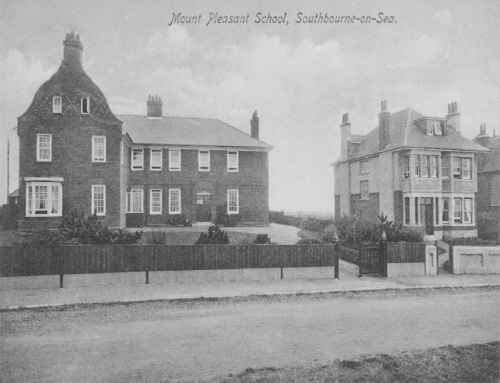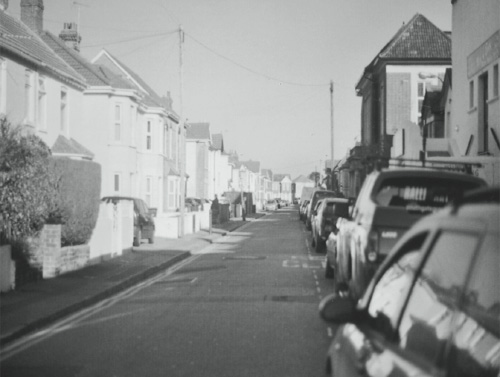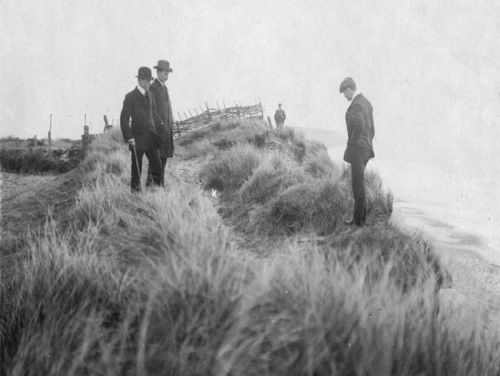Dorset Murders (13 page)

O
n 20 February 1908, a group of boys from Mount Pleasant School were out walking with their teacher on the cliffs at Southbourne when they spotted a woman lying apparently asleep in the grass. Thinking it was rather too cold a day for sunbathing, the boys hurried to tell their teacher, Robert Spurgeon, what they had seen. Spurgeon dismissed their chatter and insisted that the walk continue, but when the woman was still there on their return, he decided that he should take a closer look.
At first glance, it was evident that not only was the woman dead, but that she had not died of natural causes. Her neck was marked and the backs of both of her hands were scratched, as if she had tried to fight off an attacker. Two handkerchiefs were balled up and stuffed into her mouth.
Spurgeon called over another rambler, who agreed to stand guard over the body while Spurgeon went for help and removed his young charges from the scene of the crime. Spurgeon then went to the nearby coastguard station to report what he and the boys had found.
The police arrived at the scene, already having a theory about the possible identity of the body. The previous day, thirty-six-year-old Emma Sherriff had been reported missing from her lodgings in Palmerston Road, Boscombe, having not been seen for two days. Their theory was quickly confirmed.
Emma Sherriff was a rather frail woman who did not always enjoy the best of health. After years of working in service, she had received an inheritance of £600 and now lived off the income from her nest egg, supplemented with money that she earned with her skills as a dressmaker. She was a religious woman, regularly attending services at St John's Mission Hall in Boscombe, and it was there that she formed a close circle of female friends.

Mount Pleasant School, Southbourne-on-Sea, 1917
.
Probably the best of those friends was widow Annie McGuire, who was a nurse. Annie lived in Tower Road and Emma often stayed overnight at her friend's house, even occasionally sleeping in Annie's bed when she was working the night shift. Annie shared her home with her son, John Francis McGuire, who was always known as Frank. Emma had known Frank, who was fifteen years her junior, since he was a boy and he was in fact her only male friend.
Frank had served in the Army since 1903, first in the Royal Artillery, then in the Horseguards and finally in the Lifeguards. Whenever he was on leave he would travel back to Bournemouth to visit his mother and, while he was there, it seemed his friendship with Emily might have developed into an intimate relationship. Emma often stayed overnight at the McGuire's home, even when Annie was working. She would always ask the McGuire's landlady, Amelia Galpin, not to tell Annie that she and Frank had been together in the living room all night with the lights out and Mrs Galpin complied, feeling that whatever the couple did behind closed doors was none of her business.
In 1906, to the consternation of both his mother and Emily, Frank apparently disappeared. He stopped visiting and his regular letters home ceased abruptly. Despite their combined efforts, Annie and Emma were unable to find any trace of him until, in January 1908, Emma finally received a letter from Frank, in which he apologised for not being in touch and asked if he could visit her in Bournemouth.

Tower Road, Boscombe, 2008. (
©
N. Sly)
In spite of Frank's request in the letter that Emma didn't mention anything to his mother, Annie was the first person that Emma told. Having given up nursing and gone into service, Annie had left the house in Tower Road for a live-in position in Boscombe. Hence, Emma arranged with her own landlady in Palmerston Road, Mary Lane, for a room to be set aside for Frank's use when he visited. Annie warned her that Frank was no longer a boy and that there may be talk, but Emma was unconcerned by the prospect, saying that she was a grown woman and could do as she liked.
Having made arrangements for his visit, Emma wrote back to Frank, using her own special nickname for him;
My dearest Sonny, You can't know or think how welcome your letter was this morning after so long, as we didn't know what had happened to you. Dearest Sonny, you must forgive me. I had to tell dear mother the good news I have from you. It has been a dreadful time of anxiety for us both and I couldn't help telling her to relieve her mind. You must forgive me betraying your confidence.
The letter was signed âGod bless you and keep you, dearie. Fondest love, from your ever loving, sister Emmie' [
sic
].
Frank arrived in Boscombe on 7 February 1908 and moved into Emma's lodgings. He was originally intending to stay for a week, but extended his stay until 17 February. He and Emma went out together several times and, as he was leaving to catch his train back to Waterloo, Mary Lane jokingly asked him if he planned to take Emma with him. âNo, not yet', replied McGuire.

Location of the body of Emma Sherriff, 1908. (
©
N. Sly)
When Emma returned to her lodgings after seeing Frank off at the station, she was shocked to find some of her personal belongings were missing. Her gold locket and chain, a bracelet and her savings of around £5 were nowhere to be found. Although Frank had gone to London on the afternoon train, he was planning on returning to Christchurch that evening and Emma had arranged to meet him at a crossroads in Soutbourne at 7.30 p.m. Emma confided to a friend, Lily Hatch, that she intended to confront him about the missing items, urging, âDon't say anything to anyone until I've seen him.'
Lily saw Emma again the following morning and asked how the evening had gone. Emma told her that Frank had said that he had taken the items as a joke and was planning to return them that evening, but had left them in his bag at Christchurch. He had promised to bring them back the following day and arranged to meet Emma for dinner at midday.
While Emma was talking to Lily, a letter was delivered to her lodgings and Mary Lane gave it to her when she returned at just after eleven o'clock. Mrs Lane saw Emma again at one o'clock, at which time she thought that Emma looked rather upset. Then, later that evening, she heard Emma lock the door of her room and go out.
Emma didn't return that night, but Mrs Lane assumed that she was staying with a friend. The next morning, Wednesday 19 February, a telegram arrived for Emma and Mrs Lane took it up to her room. She found the door locked and the window blinds drawn down.
Worried, she sent her niece to see Annie McGuire, but Emma had not stayed the night with her. On hearing that Emma had not been seen since the previous day, Mrs McGuire decided to open the telegram. It was from her son, Frank, and read simply: âMeet me at three o'clock at Boscombe'.
Mrs McGuire went straight round to Emma's lodgings in Palmerston Road. Shortly after she arrived, Frank also turned up, followed by Lily Hatch and another friend of Emma's, Mrs Carroll. Mrs Lane led everyone upstairs to Emma's rooms and when a spare key could not be located, she instructed Frank to break down the door. When they gained entrance to the room, Emma's friends found that her bed hadn't been slept in.
Lily Hatch managed to steal a quick word with Annie McGuire. âYou have been deceived', she whispered. âThere has more been going on between Frank and her than you know of. You thought Frank went back to London on Monday, but he didn't.' Annie McGuire was disbelieving. She had received a letter from Frank that very morning, clearly posted in London the night before. In it Frank had written that he and Emma had made plans to go to the theatre on Wednesday evening that week and asked if she would like to come too.
Annie McGuire sent Frank to check the hospital and to report Emma's disappearance to the police and, when he had left, continued her conversation with Lily Hatch. She learned about the missing jewellery and money and that Frank had spent Monday night staying at the Salisbury Hotel, Boscombe, rather than in London, as she had thought.
Meanwhile, Frank McGuire was at Boscombe police station enquiring whether there had been an accident involving a woman. He explained to the officers that he had made arrangements to meet a lady that afternoon but that she hadn't kept their appointment, nor had she been seen at her lodgings since the previous day. He told police that he was a businessman and that he would be returning to London at 11.30 a.m. the following day, promising to call back and leave his name and address if Emma hadn't been traced by then. The police officers thought that he seemed nervous, pale and shaken, but they reasoned that reporting a friend as a missing person was likely to upset anyone.
Frank stayed the night at the Salisbury Hotel, having first had to answer some questions from his mother. He admitted to her that he had stayed in Boscombe on the Monday night and hung his head when his mother confronted him about Emma's missing belongings. Mrs McGuire thought that Emma may have travelled to London to see Frank in order to try and retrieve her money and jewellery, so she asked Frank to send a reply paid telegram to his London lodgings to ask if a woman had called there for him. Frank sent the telegram on his way to the station and later a reply arrived at his mother's house saying that nobody had called.
Soon afterwards, Annie McGuire heard that a woman's body had been found on Southbourne Cliffs. When the identity of the body was confirmed as Emma, Mrs McGuire sent a telegram to Emma's mother, Jesse Lavers of Plymouth.
Mrs Lavers took the next train, arriving at Palmerston Road to be told by Mrs Lane that her daughter had been âdone to death'. Annie McGuire, however, firmly believed that Emma had committed suicide. She was unable to acknowledge the truth behind Emma's tragic demise since, had Emma been murdered, then the most logical suspect would have been her beloved son, Frank. When questioned by police, she continued to insist that Frank had been in London on 18 February, showing them the postmarked letter from him as proof.
Officers from the Metropolitan Police Force were at Frank McGuire's London address within a day of the discovery of Emma's body, requested by their colleagues in Bournemouth to detain him. Frank was charged with Emma's murder and brought back to Bournemouth for questioning.
The inquest into Emma's death opened on 22 February. A post-mortem examination, conducted by police surgeon Dr Harold Simmons, revealed that she had numerous injuries including a broken rib and flattening of the left-hand side of her chest, severe bruising to the abdomen and internal bleeding from her stomach, spleen and bowels. Dr Simmons believed that death was due to this internal bleeding coupled with shock and estimated that Emma Sherriff would have lived for between ten and twenty minutes after the injuries had been inflicted. He was unsure exactly what had caused the injuries but suggested that she had either been kicked, punched, kneed or struck repeatedly with a blunt instrument.
As the inquest progressed, more became known about Frank's mysterious life in London. He had deserted from the Army eighteen months previously and formed an allegiance with a retired officer, Major Powell Moore. Such was their relationship that McGuire often called himself Powell and the Major referred to him as âmy son', even showing people pictures of his dead wife, telling them that this was âFrank's mother'.